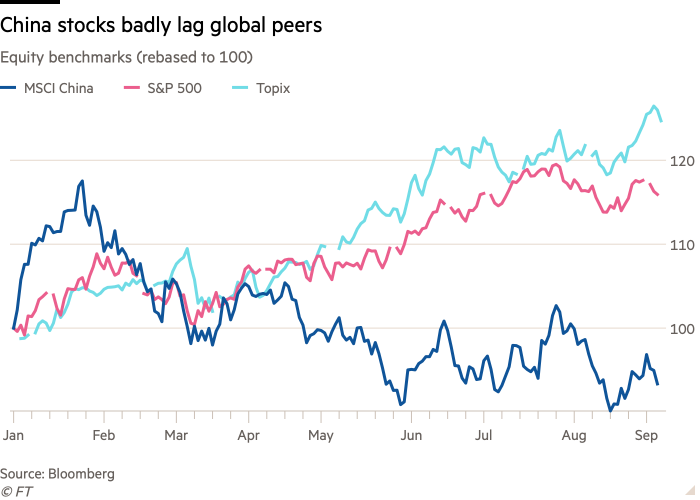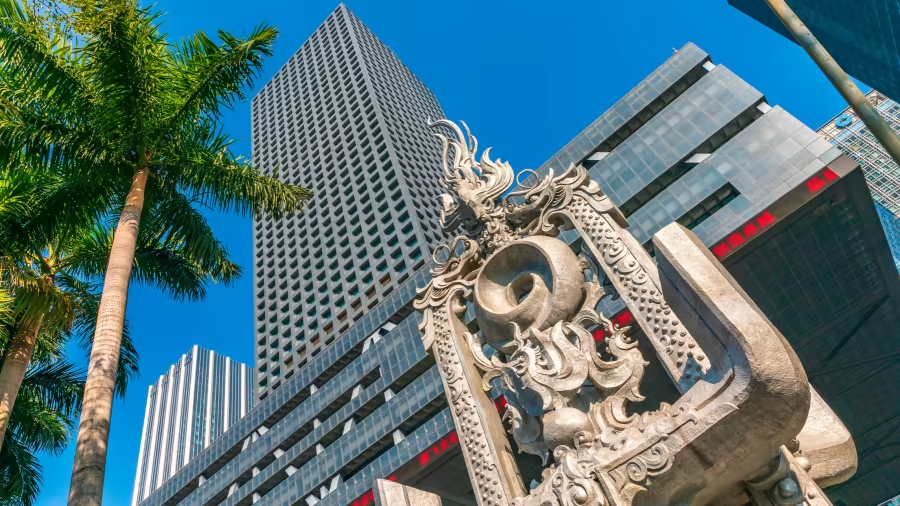Fund managers flying into Hong Kong to check on the health of the Chinese economy are finding little reason to dive back into the country’s stock market, with some warning that global investors will not be tempted back unless Beijing deploys a stimulus “bazooka”.
A string of high-profile investor conferences in the Asian financial hub began this week with Jefferies’ event at the Grand Hyatt hotel overlooking Hong Kong’s harbour. The gathering marked the first visit for many western investors since the start of the global pandemic, thanks to the city’s tough Covid-19 quarantine measures, which were only lifted this year.
But by the end of the three-day gathering — with roads near the hotel submerged beneath waist-deep rainwater from the biggest downpour to hit the city in almost 140 years — delegates from the US, Europe and elsewhere in Asia were downbeat on China’s markets.
“Historically, every time there’s been a big problem . . . there’s been a big policy bazooka in response,” said Michael Kerley, a portfolio manager at Janus Henderson Investors, referring to a large-scale stimulus like that deployed by Chinese authorities during the global financial crisis in 2008. “Now the market wants a traditional Chinese bazooka and I don’t think it’s coming.”
Despite months of poor economic data and missed payments on developers’ international bonds, Beijing has so far limited its support to measures such as lowering mortgage rates and down payments and cutting lending costs, rather than launching the kind of big fiscal stimulus or bailout for the real estate industry that many global investors would like to see.
The investor conferences held in Hong Kong this month by groups including Jefferies, CLSA and BNP Paribas come at a pivotal time for Chinese markets. They have badly lagged global peers this year because of an underwhelming economic rebound from years of pandemic-era isolation and a liquidity crisis in the country’s vital property sector.
In August alone, foreign investors dumped a record $12bn worth of Shanghai- and Shenzhen-listed stocks, with US commerce secretary Gina Raimondo ending the month with a visit to Beijing where she warned that US companies were beginning to see China as “uninvestable”.
This week, China’s renminbi fell to a 16-year low against the dollar, tumbling past the nadir it touched roughly a year ago when cities across the country entered economically disruptive lockdowns as part of President Xi Jinping’s now-defunct zero-Covid policy.

At the Jefferies conference this week, China’s economic outlook was front of mind among fund managers canvassed by the Financial Times.
“We want to understand what it would take to convince one of the really big US funds — say something with a government component like a teachers’ fund or something like that — to think of China as investable again,” said one western hedge fund manager. “I have to say, after two days, I have not seen a signal like that.”
Several investment managers said that Chinese equities had already undergone a structural derating this year as global investors shrunk their long-term allocations to Chinese stocks. Some said it was not yet over.
“I’d have thought we’d be done derating after a few months but I was really surprised by the size of the cuts to exposure in August,” said a portfolio manager at one US investment group, who expressed doubts that China would hit its annual growth target of “about 5 per cent” this year.
“Previous administrations really tried to hit GDP targets,” the portfolio manager said, “but this one cares less.”
An equity portfolio manager at a sovereign wealth fund from elsewhere in the region said that “statistically speaking, when you look at share prices, we should be close to done derating, but there’s still a lot of room left to fall” if the property crisis worsened or growth weakened further.
“We’ve been getting very mixed messages on China,” he added, pointing to high-profile promises of greater policy support made by top leaders in late July, which resulted in a flurry of foreign buying. Those inflows subsequently reversed over signs of continued weakness in consumer spending and as hopes faded for a bailout of China’s struggling property sector, which typically accounts for about a quarter of economic activity.

Janus Henderson’s Kerley said it was premature to label China’s stock market “uninvestable” when it was still in the middle of a necessary economic transition away from overreliance on the property sector.
But other investors said the conference had offered little to change attitudes to China back at headquarters.
“I have learned quite a lot but I think that when I write all this up and talk to my colleagues back home they are going to stay [out of Chinese equities],” said one hedge fund manager from the US. “They don’t feel any FOMO [fear of missing out] not being invested there right now.”
Source : FinancialTimes


